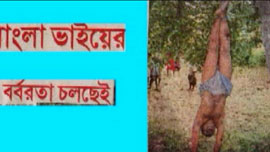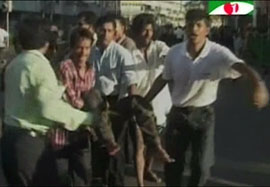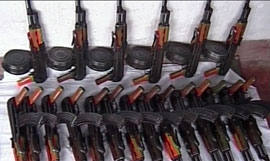Bangladesh’s war with extremism
Experts say country has become a safe haven for al-Qaeda-linked organisations.

 |
| Bangla Bhai led the outlawed Jumatul Mujahideen Bangladesh |
Bangla Bhai was revered by thousands and feared by millions. His ideals and methods changed people’s lives forever.
On Friday the chief of the outlawed Jumatul Mujahideen Bangladesh (JMB) was hanged along with five others convicted of killing two judges in 2005.
Bangla Bhai may be gone, but his legacy will last a lifetime.
Experts say his case highlights how Bangladesh has become a safe haven for al-Qaeda-linked organisations.
Golam Mostafa Bablu told us how his brother died after being viciously beaten in public.
He was hanged upside down over a specially erected platform and beaten with sticks and iron bars, his screams amplified by a public address system.
“I could only ask them to stop, I couldn’t do anything else,” Bablu said. “I couldn’t bear that scene so I just bent my head down and I became faint. I cannot explain the feeling.”
Legacy of fear
 |
| Bangla Bhai and his men tortured and killed hundreds of people |
Bangla Bhai and his men tortured hundreds and killed dozens of people in the name of Islam.
His reign has now come to an end but he leaves a legacy of fear.
Local residents close to where Bangla Bhai was based say his men have gone into hiding. They are scared that they will come back.
It is estimated that there are about 50,000 Islamic fighters in the country in groups like Bangla Bhai’s. They are said to be well-trained and organised.
“They are after introducing sharia [Islamic law] into Bangladesh,” said Shariar Kabir, a writer and journalist who has written extensively on Islamic groups in Bangladesh.
“They want to convert Bangladesh into a monolithic Islamic country like Taliban-ruled Afghanistan. Their main target was our secular constitution and secular laws. They also targeted the West.”
Bombings
 |
| Hundreds of simultaneous bombings hit Bangladesh in August 2005 |
In the past Bangladesh has been hit by a series of bombings.
The worst were in August 2005 when hundreds of bombs were simultaneously exploded across the country.
Security forces have uncovered large caches of weapons and explosives, suggesting that these groups have well-established links with outside organisations.
A former commander of a training camp inside the country, who did not want to be identified, told us that he has intimate knowledge of the international links Bangladeshi groups have with outside organisations, including al-Qaeda.
He told us that 3,000 Afghan veterans are in Bangladesh, that rebel leaders met Osama bin Laden in Afghanistan in 1998 and, with his support, they set up a branch of al-Qaeda in Bangladesh.
Experts say the groups have infiltrated every sector of the Bangladesh economy.
 |
| Bangladesh’s madrassas have more than three million students |
Professor Abdul Barkat, a Bangladeshi economist, says the money comes not only from the Middle East, but also from second- or third-generation Muslims in the West who do not realise that their donations will end up in the madrassa religious school system.
Critics have said that some madrassas – of which there are 64,000 in Bangladesh – have become breeding grounds for Islamic extremism.
It is a charge firmly denied by Mufti Falzul Haq Amini, a former member of parliament who runs a madrassa in the centre of Dhaka, the Bangladeshi capital.
“They want to destroy the madrassa education system as it is gaining in popularity and people are coming towards Islam,” he said.
“So they want to destroy the madrassas by linking them with terrorism. But the reality is, the madrassa is not linked with militancy.”
‘Recruiting ground’
 |
| Security forces have uncovered large caches of weapons and explosives |
There is no suggestion that Mufti Amini’s madrassa has any links with so-called terrorist groups.
But experts fear that other madrassas do.
Kabir has investigated many of the funds headed for Bangldeshi madrassas and says the schools are receiving “an enormous amount of money” from the Middle East and Saudi Arabia, and become the recruiting ground of al-Qaeda and other groups.
Religious parties openly say they want an Islamic state and sharia in Bangladesh but are not prepared to use violence to obtain them.
But for Islamic rebels violence seems to be the only way.